Tried to watch Fox News coverage of “President” Traitorpants’ flyover at Mount Rushmore; 10 minutes and two MyPillow ads later, we had to cleanse our palates with “Peppa Pig.”
I need a drink.
Tried to watch Fox News coverage of “President” Traitorpants’ flyover at Mount Rushmore; 10 minutes and two MyPillow ads later, we had to cleanse our palates with “Peppa Pig.”
I need a drink.
Spending a beautiful day off doing some belated spring cleaning before dropping off a bunch of stuff to Goodwill and running a couple of retail errands.
Somehow, being productive like this makes me happy.
I’m grateful for the role of cellphones in the capture of injustices that must be fought and corrected. But there’s a difference between being on watch and being a voyeur.
Unless it depicts either cute animals or a threat to my personal well-being, social justice, or national security, I don’t want to see that security camera footage, hear that 911 call, or view your cellphone video. The level of especially gratuitous voyeurism these days is pathetic.
Reality TV culture is evil. And that has ultimately led to a threat to my personal well-being AND national security in the highest reaches of government in this country.
New owners, old employer, horrible future. There’s a petition going around to save the Chicago Tribune from its particularly greedy hedge fund owners. Please sign in support of local journalism.
Went to our favorite neighborhood breakfast diner for the first time in months; it just reopened today as part of our state’s Phase 4 of reopening businesses.
If not for the social distancing need, I would have hugged the staff upon arrival.
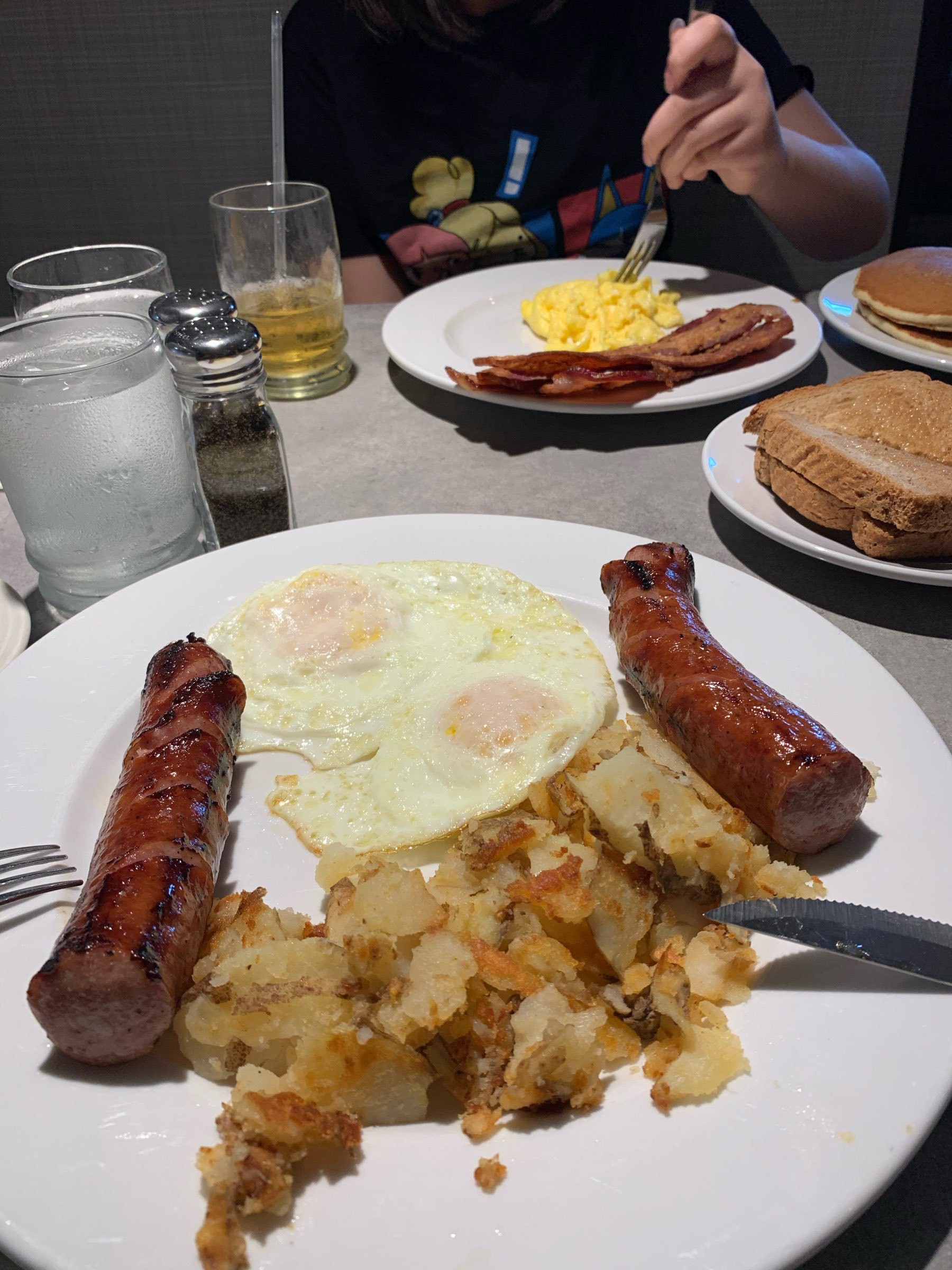
Made Spam musubi with way too much sushi rice. Got bread baking in the oven, and potatoes boiling on the stove.
It’s a good day for starches at our house.
My weekends have fallen into a routine that is neither perfect nor exciting, but it’s comfortable. Much of my off time ends up in the home office, where my personal laptop actually fits into the same dock I use for the work laptop.
It’s probably not a great idea to spend my relaxation time in the same place where I slog through work. But the home office is still my personal space, with a futon sofa and most of my books and arts/crafts materials stashed there. The dogs love the space. Frannie comes in with her gaming and talks Animal Crossing and Pokemon strategy. And I can stream Korean baseball and other video on the big screens. It’s become my happy place, and it helps make work tolerable on rough weekdays.
A typical weekend goes something like this.
Saturday morning: Having biscuits and other breakfast food that C brings home from Chick-fil-A. Then listening multiple times to “Wait Wait … Don’t Tell Me!” and maybe other NPR programs either on terrestrial radio or, more likely, the TuneIn Radio app.
Saturday afternoon
** Catching up on Korean baseball, usually with Jason Benetti doing play-by-play, off the ESPN site. I don’t really keep up with the KBO at a detailed level, but I like how the games and the baseball chatter keep me pleasant company while I read or write. Like right now, as I write this. Even when MLB starts up again, I like the idea of having these games on whenever I like.
** Surrounding myself with books, which I may or may not read at length.
** Streaming other video. Sometimes Twitch feeds of Anthony Bourdain shows, Animal Crossing play, or even Bob Ross programs. Other times, YouTube with Catholic videos, Stephen Colbert reruns, or Animal Planet shows; I’ve become fond of “The Vet Life” lately.
** Writing email, snail mail, and/or blog posts. Maybe posting to Facebook (which I’ve done more – weekends only – than I have in a long time, which still isn’t a whole lot).
** Lying down to relax the chronic pain in my lower back (and shoulders and neck).
** Sifting through the piles of printouts and books in the office and bedroom, and filling up the recycling bin.
** Sometimes heading to our parish for confession and 5 p.m. vigil Mass.
Saturday evenings: Dinner, maybe a round of Cards Against Humanity (Family Edition), or maybe a fire with s’mores in the backyard.
Sunday morning: Attending early Mass (if I haven’t gone to the Saturday vigil Mass), then reading/praying through the “Celebration of the Word” liturgy with F when I get home. (F eventually will accompany me to Mass, but not right now.) After that, breakfast – either pancakes at home or hitting a local diner, with the Sunday papers in tow.
Sunday afternoon: Either a Sunday drive for all of us, or a jaunt through a forest preserve for F and C and the big dog while I stay home to relax my back. (See Saturday afternoon activities.)
Sunday evenings: Same as Saturday evenings, plus possibly some catching up with editing work after everyone else goes to bed.
It’s not thrilling or exotic, to be sure, but it works for me. And it’s not like we’re going anywhere this summer, so this is probably my weekend blueprint for a while.
I can cross “Have a colonoscopy” off my bucket list now.
Good news: My innards are fine. Even got a bonus stomach scan upon the doctor’s recommendation (after he called to make sure my health insurer would cover it). Except for a tiny stomach polyp that he sent out for an evaluation – he said it’s unlikely to be much of anything – that scan largely turned out okay.
The not-so-good news: I’m not at 100 percent today. Still feeling the after-effects of the sedation. The nurses repeatedly told me, “You’re going to have the greatest nap of your life,” and they were right. I tried to forget the fact that they used Propofol, the stuff that killed Michael Jackson.
Chris said I slept pretty much through the night, which isn’t often the case. But I still woke up groggy, and sitting up made me woozier.
The doctor and nurses also warned me I might have a sore throat from the stomach scan that went down my throat, and soreness arose last night and continues to linger.
On top of that, the abdominal cramping is back, albeit in a mild way. Funny thing is, I experienced no such pain during the past day and a half of a clear liquid diet and intestinal purging. The cramping returned after I started eating again. Starting to think it’s time to go back to the kind of low-fat diet I tried immediately after my gallbladder was removed. And maybe start curbing my dairy intake.
So, as I said, I’m not at 100 percent. I was hoping to log back into work by noon, but I went ahead and called in sick for the whole day. Glad I did. The post-sedation haze I expected has lasted well into the afternoon.
Colonoscopy prep is the worst. I sure as hell better be clean as a whistle in there when this is all over.
So, I learned the hard way that when you uninstall and reinstall Animal Crossing: Pocket Camp, you pretty much lose your data (unless you link it to a Nintendo account, which I did not). I ended up destroying my level 77 campsite empire in a matter of seconds.
Fortunately, I was off yesterday (albeit for medical reasons). I spent more time than I care to admit rebuilding my #PocketCamp world; I’m already up to level 17. And yes, I linked it all to a Nintendo account.
And get this: I have lychees! (For the uninitiated, AC Pocket Camp players can pick several kinds of fruits, with one of three rare types: grapes, lychees, or lemons. My old camp had grapes; the new camp has lychees, which I thought only showed up for players in Asia.)
But I’m low on Animal Crossing: Pocket Camp friends. If you play, hit me up: 4365 6093 734
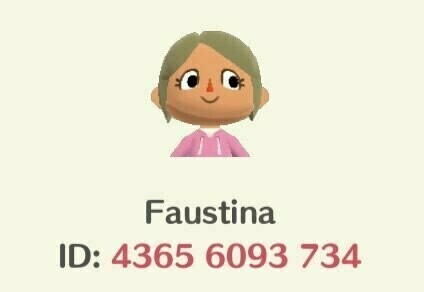
Since we aren’t traveling much this summer, I decided to try a little container gardening to spruce up the deck—despite my track record of failure with plants.
Got some Italian parsley, basil, geraniums, and some kind of blue and purple flowering plant that Frannie picked but I had never heard of. Also, a hanging basket of purple petunias, as well as lavender and catnip.
And a pink flamingo that I’ve named Bob.
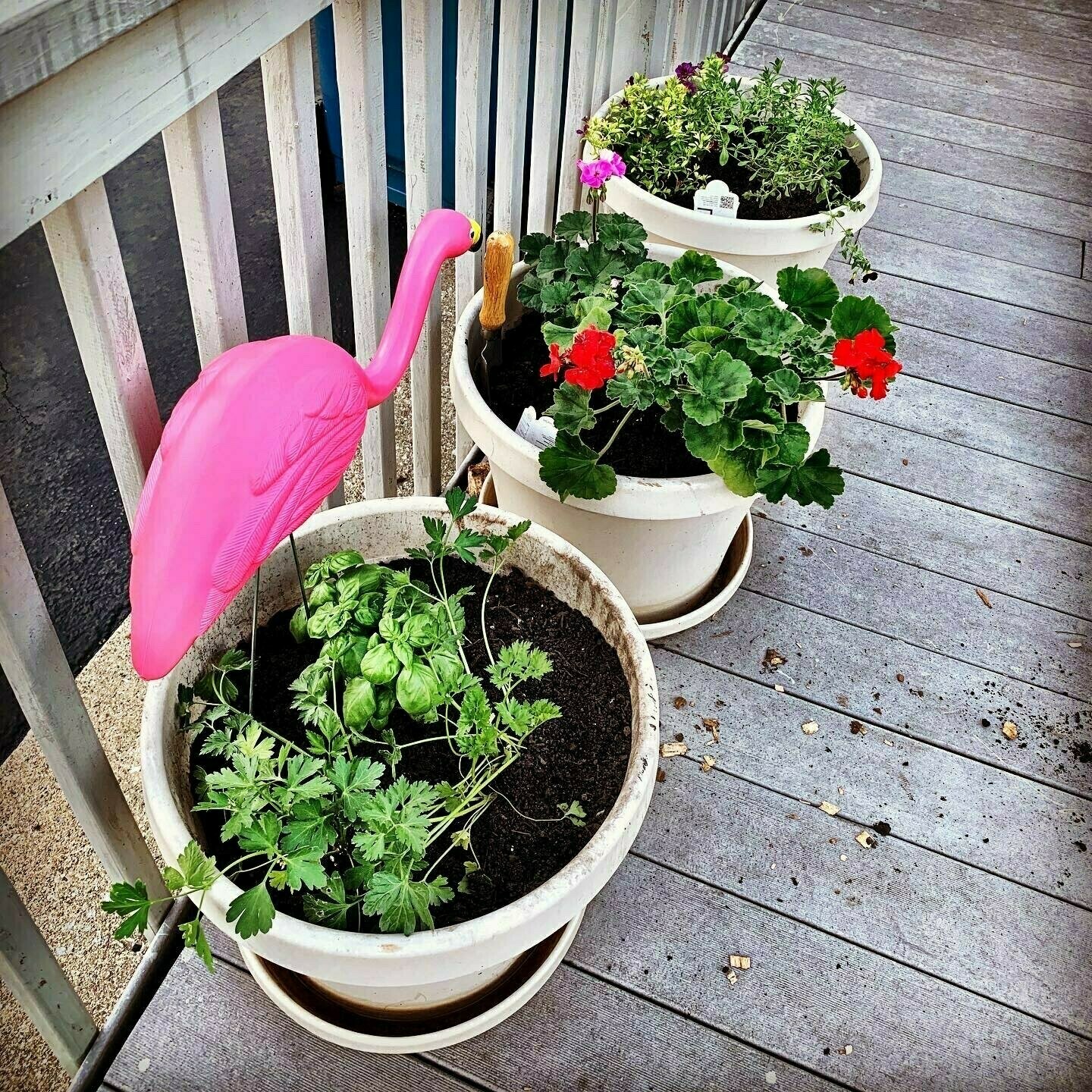

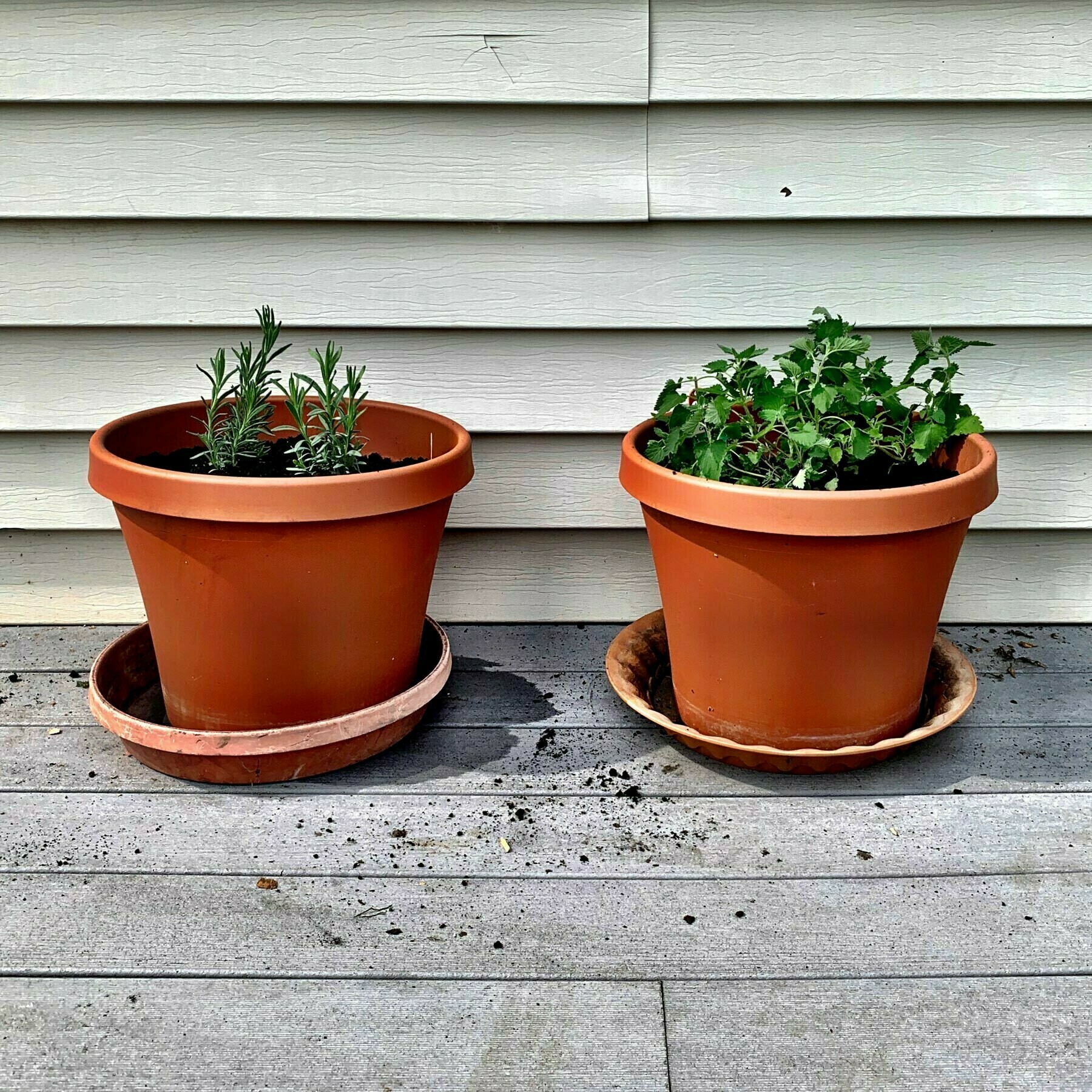
So, my hospital requires a COVID-19 test before surgeries and other procedures like the colonoscopy scheduled for me tomorrow. Found this out Saturday, so I scheduled testing for this morning at the hospital’s drive-up facility.
It wasn’t as horrifying as I anticipated; the nasal swab wasn’t quite long enough to scrape the surface of my brain, but even with the 10 seconds it took to swab, it was still uncomfortable.
In any event, I tested negative for COVID-19. Never have I been so relieved to charge ahead with extended intestinal purgation.
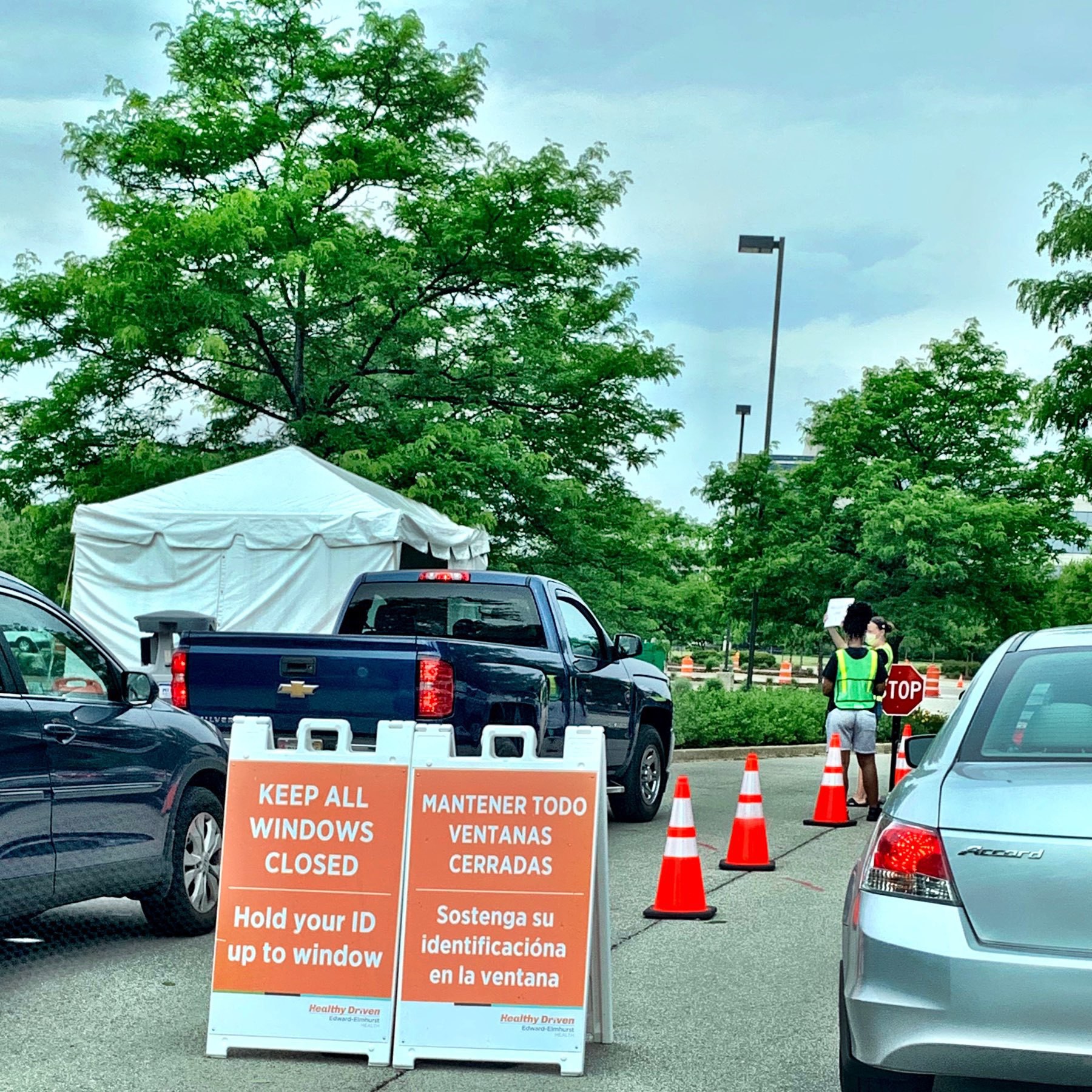
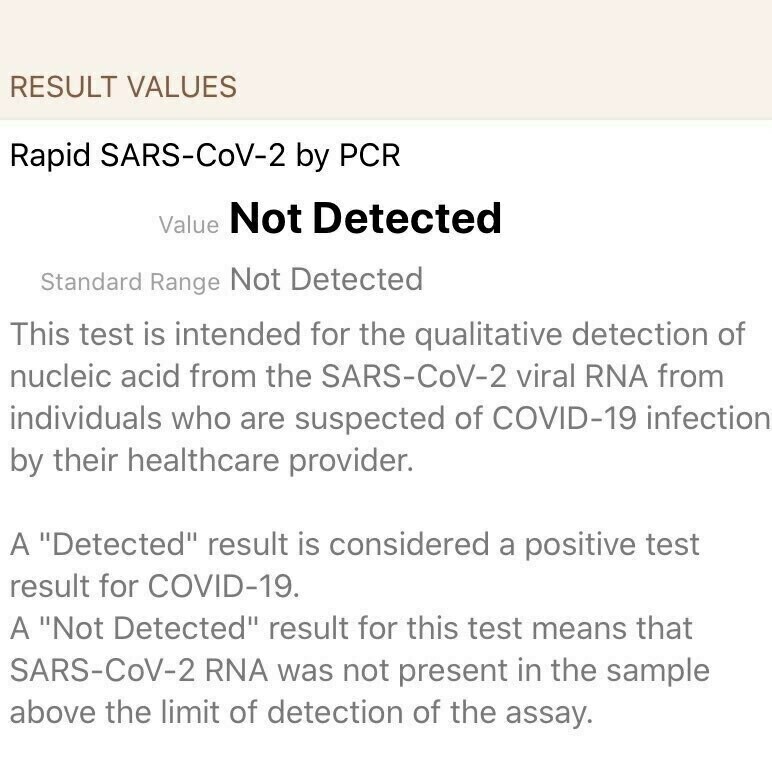
Looks like Magnificat has ended its free “Celebration of the Word” PDF distribution to help families pray along with the Liturgy of the Word on Sundays. I can understand why: More dioceses are allowing public celebration of Mass again, and it’s understandable to encourage Catholics to return to Sunday Mass. Many of those same dioceses (including ours), however, haven’t reimposed the Sunday obligation, given that plenty of people remain wary of collective worship for fear of COVID-19 infection.
As I mentioned last weekend, I’m starting to return to Sunday Mass at our parish; however, with no Sunday obligation for now and all the COVID-19 complications, I had resolved to keep F home for now and set aside time for us to go through the Celebration of the Word together.
The end of the Celebration PDF distribution complicates that plan, of course. So, I went ahead and created a Celebration of the Word document template, based on the basic Magnificat-created PDF structure, and added this Sunday’s readings and several prayers to align with the liturgy (but not replicate all of it word-for-word, as much of the Mass liturgy requires a priest). Included are the Apostles' Creed, an Act of Spiritual Communion, and the Hail Mary and prayer to St. Michael the Archangel at the end. F needs to learn the Apostles Creed and the St. Michael prayer anyway, so it seemed a good way to introduce her to those.
Meanwhile, I’m registered for tomorrow’s 7 a.m. Mass. (Registration is intended to help the parish ensure manageable, socially distanced attendance.) Not my favorite time to attend, but I’m still looking forward to it. Then, Lord willing, I’ll come home and F and I will have our own Celebration and connect with God together. Pray for us.
Gratuitous Shiny Weedle is my new favorite band name. #PokemonGO
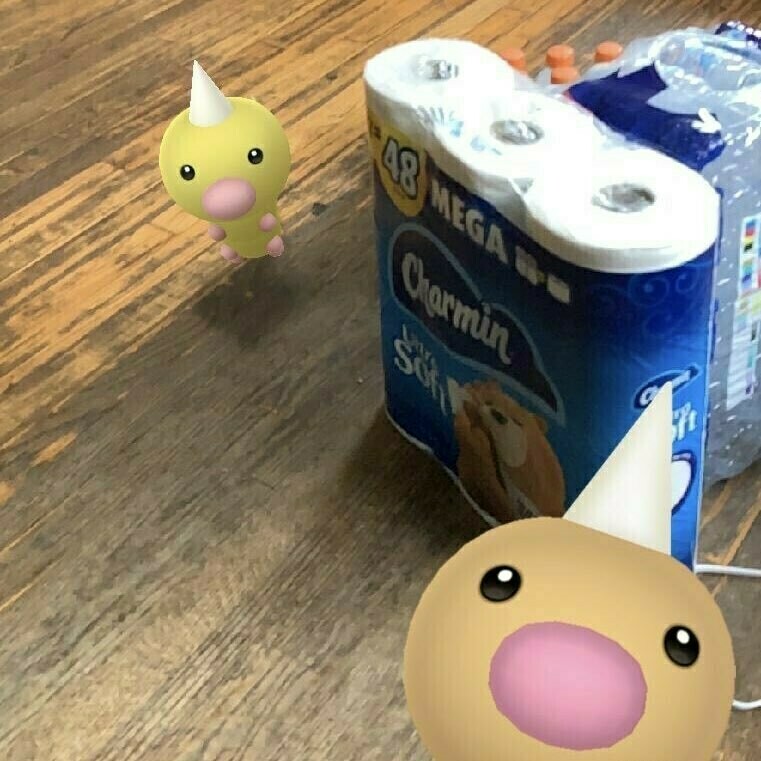
My long, hellish work week is over.
Next up: a 4-day weekend, most of it bracing for Tuesday’s colonoscopy. After this past week, I’m thinking Tuesday will be a relative snap.
Sigh. At least we finally got her to go outside.
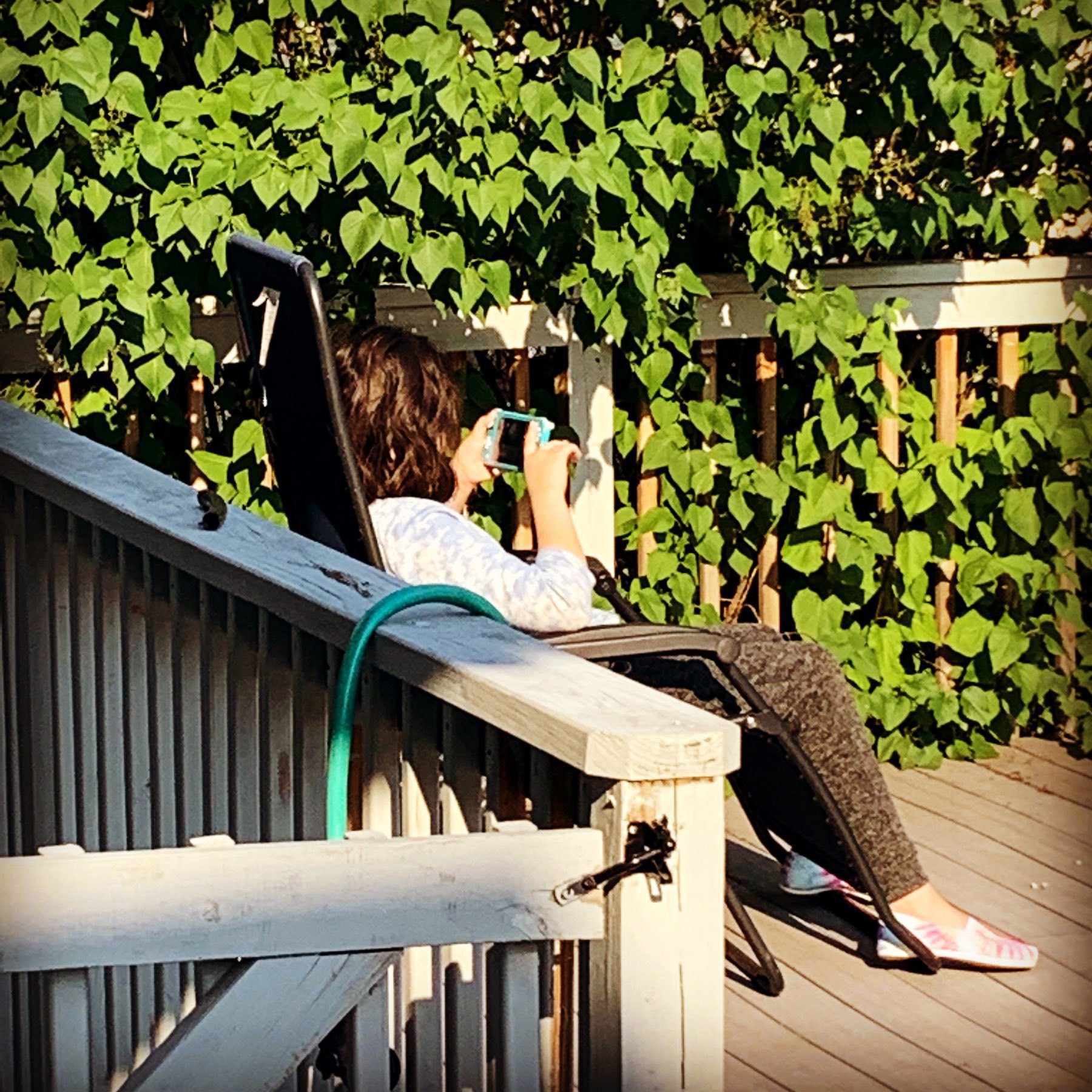
None of us still blogging do it for clicks. We do it to leave our traces, because it feels good to us, and because complete statements are better than tweets or facebook updates.
~ Warren Ellis (quoted by @AustinKleon)
That KBO cheer song for ESPN’s Karl Ravech has been threading its way through my brain for several days now. I know that, theologically speaking, there are far worse definitions of hell, but this is mine at the moment.
There is a world of hurt and awfulness out there, but apparently not enough to avoid social media speculation over a cartoon sponge’s sexuality.
In New Seeds of Contemplation, Thomas Merton says that retreating into solitude should not be used as an escape from the world but as a means to live more fully in it. “Go into the desert,” he wrote, “not to escape other men but in order to find them in God.”
~ John Dougherty, “Don’t feel guilty about taking a retreat from Trump,” America
Next read. Already read the intro online, and I look forward to being schooled further.
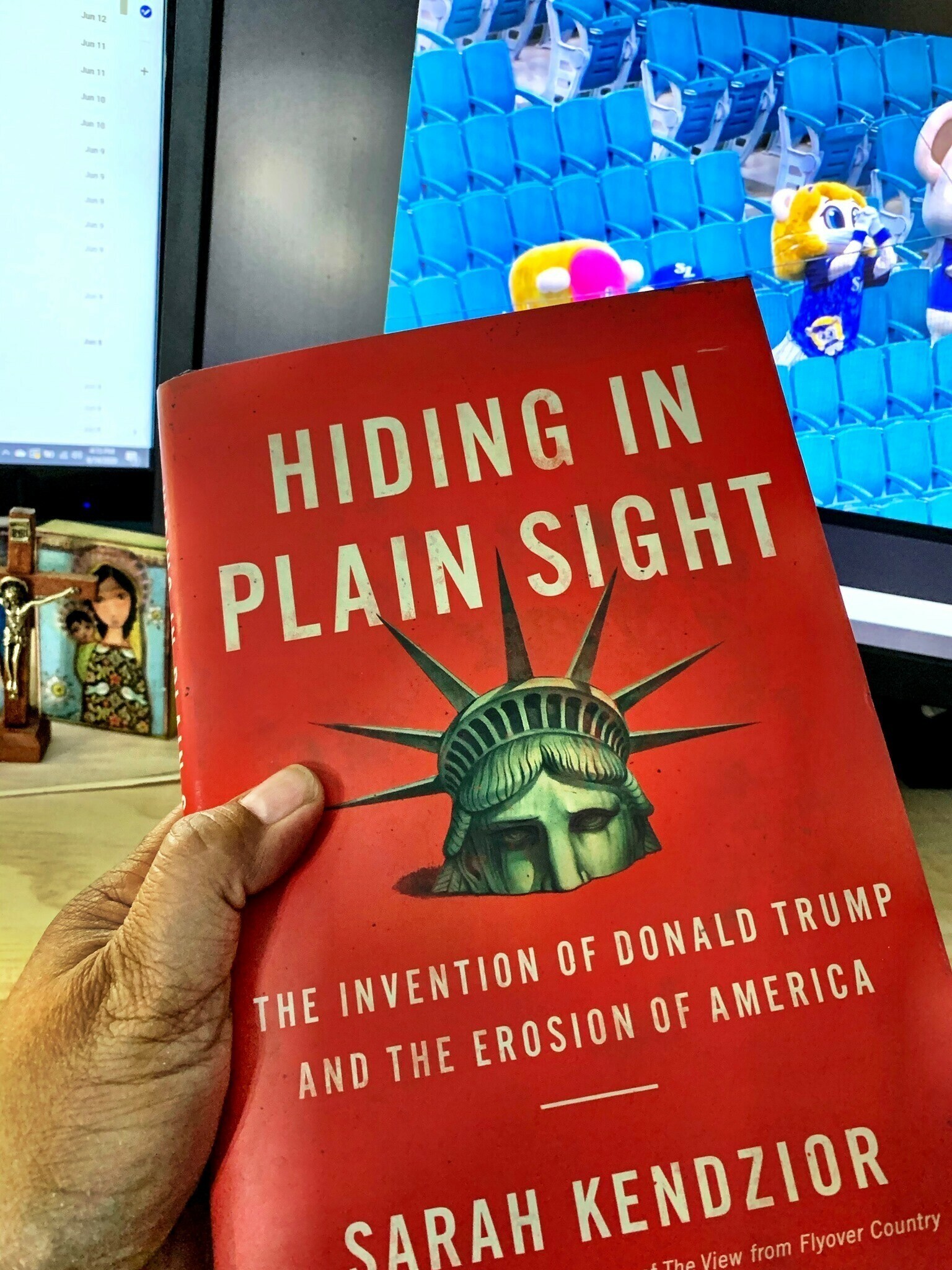
It somehow seemed appropriate to return to Mass on the feast of Corpus Christi (or the eve of Corpus Christi, as I attended the Saturday vigil Mass). Our parish, under guidance from the archdiocese, began offering Sunday Mass last weekend, but I didn’t feel ready to return then. But it was time this weekend.
Started out my Saturday afternoon at church in a makeshift confessional, set up in the parish cry room, I guess to allow for easier disinfecting after each confession. After four months in an inert spiritual state, it felt good to “get back on the wagon,” as the priest put it, and start fresh with God’s grace.
I was allowed to stay for the 5 p.m. Mass, and that gave me a half-hour to sit and realize how much I missed being in church. I also realized how much I need a more breathable mask.
The experience wasn’t ideal in a few respects: I couldn’t really hear the priest well, I forgot to wear the beret headcovering I use in church, I forgot to bow before receiving, and I received in the hand (like the archdiocesan rules said I had to) when it turned out that plenty of people were able to receive at the communion rail on the tongue, as I prefer. I felt out of practice. But I was still glad to be back.
The Sunday obligation remains suspended in our archdiocese, but I’m going to try to keep going – and I might even try to hit a weekday Mass here and there. In the meantime, I’m not going to take F with me until the obligation is in place again and the pandemic rules are relaxed a bit. And then I have to set up time with the pastor to see when she can begin receiving the Eucharist.
F and I have been using “Celebration of the Word” handouts and her new subscription of Magnifikids! from Magnificat magazine each Sunday morning to read through the Liturgy of the Word, pray, and learn a bit about feasts and other things that I thought she learned in her Episcopal Catechesis of the Good Shepherd lessons (but didn’t!). She seems to be connecting with this Sunday time more than she tended to at services in our old Episcopal parish, so I’m in no hurry to stop it.
It’s been a good weekend to contemplate God and start over with Him. Deeply grateful.
Tried to spend some time on the deck while C and F went out on a forest preserve jaunt, but (1) it was too damn hot, (2) the dogs refused to join me, and (3) hip and lower back pain still persisting. Back in the home office with books, dogs, and KBO rerun streaming.
I wasn’t kidding about quality time this weekend with Merton and Day. Found some other worthwhile things to review for these times. (Under the books: a printout of Merton’s “Letters to a White Liberal” dating back to 1963 and 1964.)
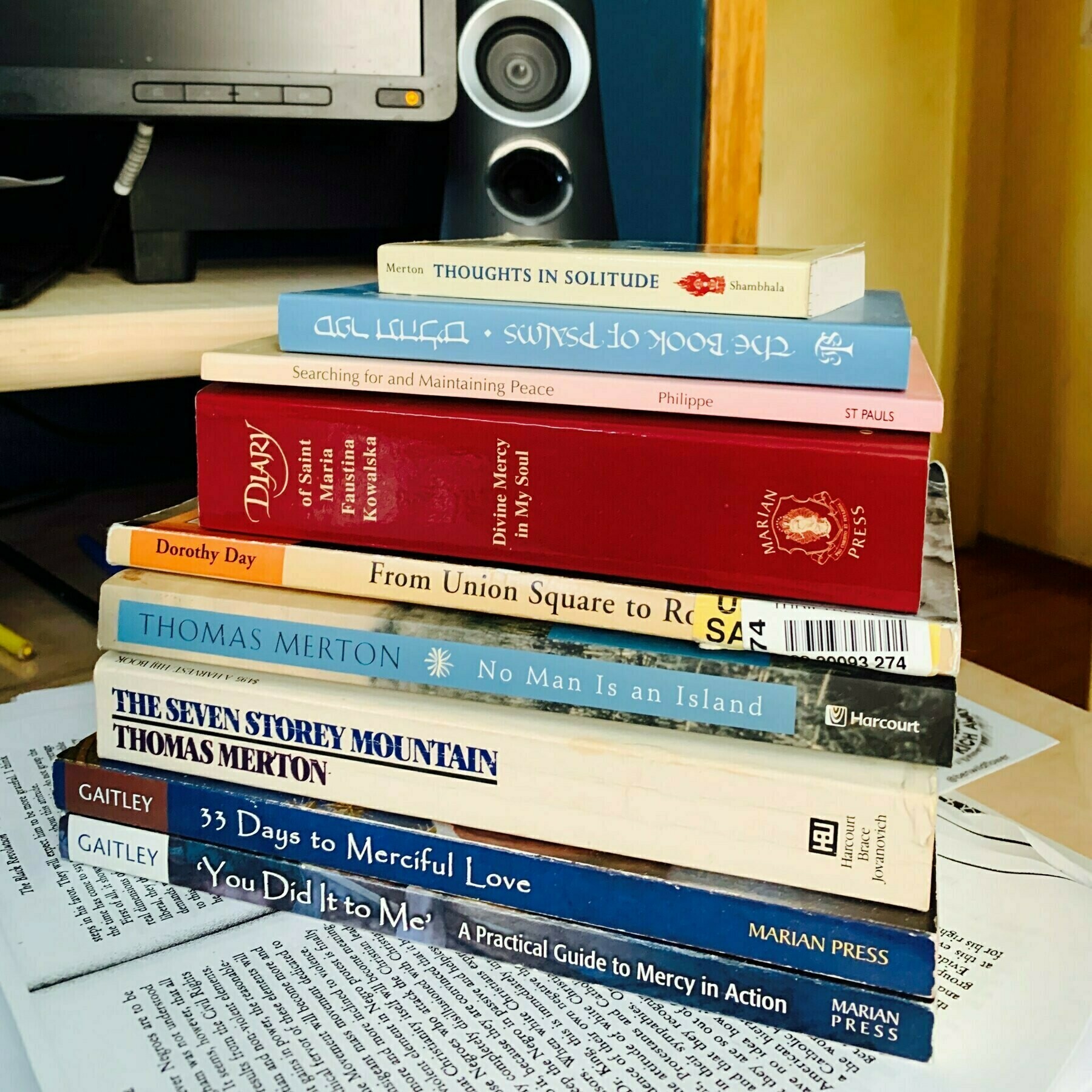
Hunkering down this weekend to make sense of the world with Dorothy Day, Thomas Merton, and the Psalms. My brain needs a little peace right now.